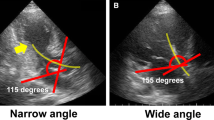Abstract
Impella (Abiomed, Danvers, MA, USA) is a percutaneous trans-catheter left ventricular assist device. Anticoagulant therapy targeting whole activated clotting time (ACT) between 160 and 180 s is recommended to prevent pump thrombosis during support. However, we sometimes experience fatal bleeding despite achieving the target ACT range. Consecutive patients who received Impella support in our institute between March 2018 and October 2020 were included in this retrospective study. The association between the averaged ACT levels during the Impella support and 30-day mortality was investigated. A total of 36 patients (71 years old, 61% males) were included. Most of the patients were managed within the recommended therapeutic range of ACT, and the average ACT level was 162 s. The higher ACT group (> 168 s) had older age, smaller body mass index, and higher serum creatinine compared with the lower ACT group (p < 0.05 for all). A higher ACT level was an independent risk factor of 30-day mortality with an adjusted hazard ratio of 1.085 (95% confidence interval 1.037–1.154) with a cut-off level of 168 s. There were only two thromboembolic events. Patients managed with higher ACT levels had a higher risk of 30-day mortality during Impella support. A low-dose heparin purge solution might be recommended in patients with high-risk for bleeding events.


Similar content being viewed by others
References
Burkhoff D, Sayer G, Doshi D, Uriel N. Hemodynamics of mechanical circulatory support. J Am Coll Cardiol. 2015;66:2663–74.
Basir MB, Kapur NK, Patel K, et al. National cardiogenic shock initiative i. improved outcomes associated with the use of shock protocols: updates from the national cardiogenic shock initiative. Catheter Cardiovasc Interv. 2019;93:1173–83.
Patel N, Sharma A, Dalia T, et al. Vascular complications associated with percutaneous left ventricular assist device placement: a 10-year US perspective. Catheter Cardiovas Interv. 2020;95:309–16.
Badiye AP, Hernandez GA, Novoa I, Chaparro SV. Incidence of hemolysis in patients with cardiogenic shock treated with Impella percutaneous left ventricular assist device. ASAIO J. 2016;62:11–4.
Esposito ML, Morine KJ, Annamalai SK, et al. Increased plasma-free hemoglobin levels identify hemolysis in patients with cardiogenic shock and a trans valvular micro-axial flow pump. Artif Organs. 2019;43:125–31.
Davis ME, Haglund NA, Tricarico NM, et al. Development of acquired von Willebrand syndrome during short-term micro axial pump support: implications for bleeding in a patient bridged to a long-term continuous-flow left ventricular assist device. ASAIO J. 2014;60:355–7.
Goldfarb M, Czer LS, Lam LD, et al. High molecular weight von willebrand factor multimer loss and bleeding in patients with short-term mechanical circulatory support devices: a case series. J Extra Corpor Technol. 2018;50:77–82.
Dietrich JN, Kazmi H. Bleeding risks in patients on percutaneous ventricular assist devices receiving two different dextrose concentrations of heparinized purge solution: a case series. J Pharm Pract. 2019;32:464–9.
Schrage B, Ibrahim K, Loehn T, et al. Impella support for acute myocardial infarction complicated by cardiogenic shock. Circulation. 2019;139:1249–58.
Wernly B, Seelmaier C, Leistner D, et al. Mechanical circulatory support with Impella versus intra-aortic balloon pump or medical treatment in cardiogenic shock-a critical appraisal of current data. Clin Res Cardiol. 2019;108:1249–57.
Succar L, Sulaica EM, Donahue KR, Wanat MA. Management of anticoagulation with Impella® percutaneous ventricular assist devices and review of new literature. J Thromb Thrombolysis. 2019;48:284–91.
Flierl U, Tongers J, Berliner D, et al. Acquired von Willebrand syndrome in cardiogenic shock patients on mechanical circulatory microaxial pump support. PLoS ONE. 2017;12:e0183193.
Reed BN, DiDomenico RJ, Allender JE, et al. Survey of anticoagulation practices with the Impella percutaneous ventricular assist device at high-volume centers. J Interv Cardiol. 2019;2019:3791307.
Copotoiu R, Cinca E, Collange O, et al. Pathophysiology of hemorragic shock. Transfusion clinique et biologique: Transfus Clin Biol. 2016;23:222–8.
Smythe MA, Koerber JM, Nowak SN, et al. Correlation between activated clotting time and activated partial thromboplastin times. Ann Pharmacother. 2002;36:7–11.
Schurr JW, Muske AM, Stevens CA, et al. Derivation and validation of age- and body mass index-adjusted weight-based unfractionated heparin dosing. Clin Appl Thromb Hemost. 2019;25:1076029619833480.
Funding
None.
Author information
Authors and Affiliations
Corresponding author
Ethics declarations
Conflict of interest
There is no conflict of interest related to this manuscript.
Additional information
Publisher's Note
Springer Nature remains neutral with regard to jurisdictional claims in published maps and institutional affiliations.
Rights and permissions
About this article
Cite this article
Nakamura, M., Imamura, T., Ueno, H. et al. Impact of the whole activated clotting time during Impella support on short-term prognosis. J Artif Organs 25, 9–15 (2022). https://doi.org/10.1007/s10047-021-01271-7
Received:
Accepted:
Published:
Issue Date:
DOI: https://doi.org/10.1007/s10047-021-01271-7




